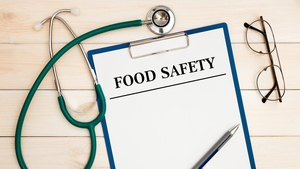
Amid a spike in COVID-19 cases due to the omicron variant, FDA recently paused certain inspectional activities.
FDA’s “temporary changes” implemented Dec. 29 likely mean the agency has halted non-mission-critical inspections of facilities producing conventional food and beverages, dietary supplements and other regulated commodities through at least Jan. 19.
On Monday, The Wall Street Journal reported the seven-day average of newly reported COVID-19 infections in the U.S. is on pace to triple the pre-omicron record set a year ago.
In a Jan. 4 roundup, FDA noted its plans to “continue mission-critical work,” but temporarily postpone “certain inspectional activities with the hopes of restarting these activities as soon as possible.”
Also, while FDA planned to commence “prioritized surveillance foreign inspection assignments” in February, those activities also have been postponed.
“FDA is also continuing to conduct mission-critical domestic inspections,” the agency added in the roundup. “State inspections under FDA contract have the discretion to make inspection decisions based on their local information.”
Throughout the COVID-19 pandemic, FDA has continued to perform “mission-critical inspections” across all the commodities it regulates, regardless of the physical location in the U.S. or outside the country, an FDA spokesperson said.
Among other commodities, FDA regulates food, including dietary supplements, drugs, biologics, medical devices and tobacco products. According to the agency, it oversees more than US$2.7 trillion in consumption of food, medical products and tobacco.
The FDA spokesperson said the agency determines the need for a mission-critical inspection based on the following factors:
o Product that received breakthrough therapy or regenerative medicine advanced therapy designation.
o Product is used to treat a serious disease or medical condition and there is no substitute.
o Product requires follow up due to a recall, or there is evidence of serious adverse events or outbreaks of a foodborne illness.
o Product is related to FDA’s COVID-19 response (e.g., drug shortages).
“While the majority of mission-critical inspections have been domestic, we have successfully conducted mission-critical inspections in nearly 30 countries,” the FDA spokesperson added via email.
FDA’s roundup further noted the agency is continuing remote foreign supplier verification program activities for human and animal foods. FDA also is using other remote tools to continue to oversee foods, drugs, medical products and tobacco.
Reaction to FDA announcement
The Consumer Brands Association (Consumer Brands), which represents food and beverage manufacturers, among others, expressed support for FDA’s recent move to protect its employees and other workers.
“A healthy and robust workforce is critical to keeping grocery store shelves stocked with essential goods, and this temporary move from FDA pausing routine inspections is a commonsense action that protects CPG facility employees and FDA inspectors,” said Consumer Brands’ Betsy Booren, senior vice president of regulatory and technical affairs, in an email.
She added, “Consumer Brands appreciates FDA’s prudent and consistent approach to inspections throughout the COVID-19 pandemic and will continue to work with all federal agencies to advance smart regulatory processes that prioritize consumer safety without compromising the availability of essential CPG goods.”
Bill Marler, a food safety lawyer who has represented victims of foodborne illness for decades, said he has always believed FDA’s inspectional oversight of food has been limited. However, he is sympathetic to the current challenges facing the agency.
“We’re in the middle of a pandemic and … what do you expect?” he said in an interview. “Every other sector of society has had to adjust to remote learning, remote courtrooms, remote depositions, takeout eating. I certainly wouldn’t want inspectors to put themselves or to put others at risk by doing in-person inspections.”
He described inspections as “snapshots in time.”
“They show … what’s bad or good on that given day, but the day before and the day after is perhaps a different scenario,” added Marler.
When the pandemic emerged in March 2020, FDA temporarily paused most domestic and foreign inspections with the exception of those deemed “mission-critical,” according to FDA Acting Commissioner Janet Woodcock in a foreword to a May 2021 report, “Resiliency Roadmap for FDA Inspectional Oversight.”
From March 2020 through September 2020, FDA conducted 117 mission-critical inspections for human food, according to the FDA report. From October 2020 through March 2021, the agency performed another 203 mission-critical inspections for human food.
And from March 2020 through March 2021, FDA conducted 494 “prioritized” U.S. inspections for human food, the FDA report disclosed. These inspections “include surveillance and certain for-cause inspections that were not determined to be mission critical,” such as those deemed “high-risk” under inspection-frequency requirements in federal law.
Outbreaks of foodborne illness
Despite interruptions in certain FDA inspectional activities since COVID-19 emerged in the spring of 2020, incidents of foodborne illness are actually down.
In September, the CDC’s Foodborne Diseases Active Surveillance Network (FoodNet) identified 26% fewer incidences of infections commonly caused by food in 2020, compared with the average annual number during 2017 through 2019. During 2020, FoodNet identified 18,462 cases of infection, 4,788 hospitalizations, and 118 deaths.
“The 26% decrease in incidence of infections caused by pathogens transmitted commonly through food during 2020 was the largest single-year variation in incidence during 25 years of FoodNet surveillance,” CDC revealed.
Changes related to the pandemic may have influenced the lower number of reported infections. For instance, CDC referenced closures of restaurants during the pandemic, the imposition of travel restrictions and potential limited number of stool samples tested due to broader use of telemedicine.
“Bottom line, there’s a lot less people eating out at restaurants,” Marler observed.
He also believes the pandemic may be responsible for outbreaks that aren’t being detected.
“Health departments have been understandably so focused on COVID that we are seeing people with E. coli, hepatitis, listeria, who in the last couple years have not been contacted by health authorities, or there’s been no follow-up when there has been [contact] because they’re focused on COVID prevention,” Marler added.
About the Author(s)
You May Also Like






